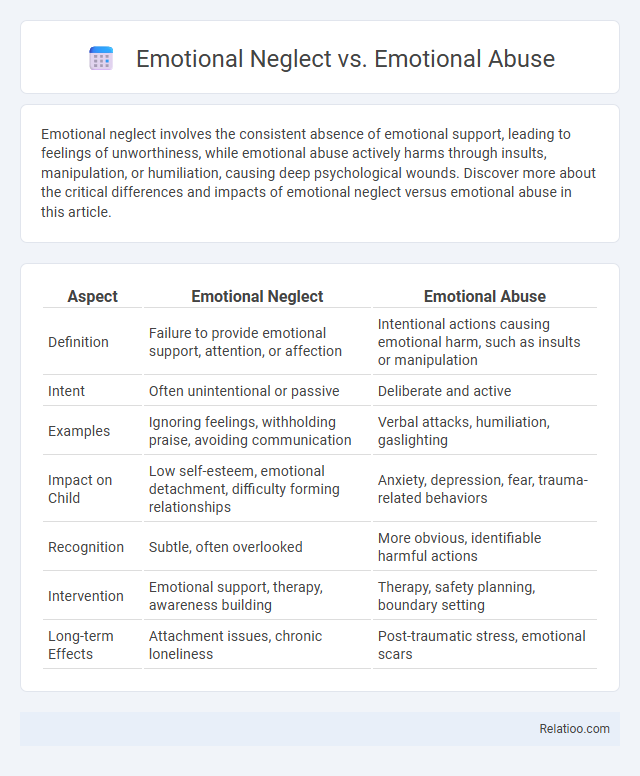Emotional neglect involves the consistent absence of emotional support, leading to feelings of unworthiness, while emotional abuse actively harms through insults, manipulation, or humiliation, causing deep psychological wounds. Discover more about the critical differences and impacts of emotional neglect versus emotional abuse in this article.
Table of Comparison
| Aspect | Emotional Neglect | Emotional Abuse |
|---|---|---|
| Definition | Failure to provide emotional support, attention, or affection | Intentional actions causing emotional harm, such as insults or manipulation |
| Intent | Often unintentional or passive | Deliberate and active |
| Examples | Ignoring feelings, withholding praise, avoiding communication | Verbal attacks, humiliation, gaslighting |
| Impact on Child | Low self-esteem, emotional detachment, difficulty forming relationships | Anxiety, depression, fear, trauma-related behaviors |
| Recognition | Subtle, often overlooked | More obvious, identifiable harmful actions |
| Intervention | Emotional support, therapy, awareness building | Therapy, safety planning, boundary setting |
| Long-term Effects | Attachment issues, chronic loneliness | Post-traumatic stress, emotional scars |
Understanding Emotional Neglect
Emotional neglect involves the consistent failure to respond to a child's emotional needs, resulting in feelings of unworthiness and invisibility. Unlike emotional abuse, which includes active harmful behaviors such as belittling or intimidation, emotional neglect is marked by omission and lack of emotional support. Recognizing emotional neglect is crucial for mental health as it can lead to long-term difficulties in forming healthy relationships and managing emotions.
Defining Emotional Abuse
Emotional abuse involves patterns of behavior that systematically undermine an individual's self-worth through verbal assaults, humiliation, intimidation, or manipulation, leading to long-lasting psychological damage. Unlike emotional neglect, which is characterized by the absence of emotional support and affection, emotional abuse actively harms a person's emotional and mental well-being. Understanding emotional abuse requires recognizing its intentionality to control or demean, distinguishing it from passive neglect or unintended emotional neglect.
Key Differences Between Neglect and Abuse
Emotional neglect occurs when a caregiver consistently fails to respond to a child's emotional needs, leading to feelings of abandonment and worthlessness, while emotional abuse involves active behaviors such as belittling, rejecting, or controlling that directly harm the child's emotional well-being. Neglect is characterized by omission, meaning the absence of necessary emotional support, whereas abuse involves commission, meaning deliberate harmful actions. Understanding these distinctions is crucial for accurate diagnosis and targeted intervention in mental health and child welfare settings.
Common Signs of Emotional Neglect
Common signs of emotional neglect include persistent feelings of loneliness, low self-esteem, and difficulty expressing emotions or connecting with others. Individuals experiencing emotional neglect often report a lack of validation, support, and affection during critical developmental stages. Unlike emotional abuse, which involves harmful verbal or psychological attacks, emotional neglect is marked by the absence of necessary emotional care and attention.
Recognizing Emotional Abuse in Relationships
Recognizing emotional abuse in relationships involves identifying patterns of manipulation, control, and verbal attacks that harm a partner's self-esteem and mental well-being. Emotional abuse often includes consistent criticism, humiliation, gaslighting, and isolation, which differ from emotional neglect, where a partner's emotional needs are ignored rather than actively targeted. Understanding these distinctions helps victims seek appropriate support and establish healthier relational boundaries.
Long-Term Effects of Emotional Neglect
Emotional neglect involves the consistent failure to provide necessary emotional support, leading to long-term effects such as chronic low self-esteem, difficulty forming secure attachments, and increased risk of anxiety and depression. Emotional abuse, distinct from neglect, includes overt actions like verbal assaults and manipulation that damage self-worth and emotional well-being. Understanding the subtle, pervasive impact of emotional neglect is crucial because its long-term effects often manifest as impaired emotional regulation and relational challenges that persist into adulthood.
Psychological Impact of Emotional Abuse
Emotional abuse inflicts profound psychological damage, often leading to chronic anxiety, depression, and low self-esteem due to persistent belittlement, manipulation, and control. Unlike emotional neglect, where emotional needs are unmet through absence or indifference, emotional abuse actively undermines Your sense of self-worth and trust in others by exposing You to harmful verbal attacks and emotional coercion. Understanding these distinctions helps identify the devastating impact emotional abuse has on mental health and the importance of seeking targeted support for recovery.
Overlapping Behaviors: When Neglect Turns Into Abuse
Emotional neglect and emotional abuse share overlapping behaviors, such as lack of validation, withholding affection, and ignoring emotional needs, but emotional abuse includes intentional harm through manipulation, verbal attacks, or humiliation. When neglect turns into abuse, the absence of care and support escalates into active undermining of Your self-worth and emotional well-being. Understanding these distinctions helps identify harmful patterns and seek appropriate support for recovery.
Healing from Emotional Neglect and Abuse
Healing from emotional neglect and abuse requires recognizing the subtle differences between these forms of harm, where emotional neglect involves the absence of emotional support and emotional abuse includes active psychological harm. Recovery often involves therapy focused on building self-awareness, validating one's feelings, and developing healthy emotional boundaries. Consistent self-care practices and supportive relationships play crucial roles in restoring emotional well-being and resilience.
Seeking Help: Support and Recovery Resources
Understanding the distinctions between emotional neglect and emotional abuse is crucial for Your healing journey, as both require tailored support and recovery resources. Emotional neglect often calls for therapy that focuses on building emotional awareness and self-validation, while emotional abuse recovery may involve trauma-informed counseling and support groups to address manipulation and psychological harm. Accessing specialized mental health professionals, peer support networks, and educational resources can significantly enhance recovery outcomes for individuals affected by these forms of emotional mistreatment.

Infographic: Emotional Neglect vs Emotional Abuse
 relatioo.com
relatioo.com